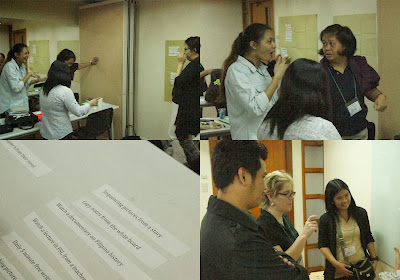A team from SDEAS and CEAD was formed to help build a rights based Deaf high school program in DLS-CSB in collaboration with P-CEN & The Nippon Foundation. The team has undergone series of training and exposure trips for the past few years to deepen their knowledge and understanding of Deaf education and to equip them with skills to be able to implement a good high school program for the Deaf. One such exposure trip was an educational visit to the Washington School for the Deaf and the California School for the Deaf held last April 26-May 3, 2014.
We invite you to attend the learning sessions we have prepared where we will share with you our learning and insights from the said trip centered on the philosophy of bilingual education.
ASL and English Bilingual Teaching Principles
By Febe Sevilla
Open Classrooms
By May Cabutihan
Assessment of Sign Language
By Christina Sison
Sandwiching Methods for the Development of Academic Signs
By Raphael Domingo
Tuesday, 30 September 2014
Wednesday, 10 September 2014
Learning Session 1
A team from SDEAS and CEAD was formed to help build a rights based Deaf high school program in DLS-CSB in collaboration with P-CEN & The Nippon Foundation. The team has undergone series of training and exposure trips for the past few years to deepen their knowledge and understanding of Deaf education and to equip them with skills to be able to implement a good high school program for the Deaf. One such exposure trip was an educational visit to the Washington School for the Deaf and the California School for the Deaf held last April 26-May 3, 2014.
We invite you to attend the learning sessions we have prepared where we will share with you our learning and insights from the said trip centered on the philosophy of bilingual education.
Parallelism of Bilingual Education, Learner-Centered Education and Best Practices in Deaf Education
By Rochelle Martin
Multi-level Instruction in Math Using Bilingual Principles
By Liezel Reyes
Smart Boards
By Vikka Sakilayan
We invite you to attend the learning sessions we have prepared where we will share with you our learning and insights from the said trip centered on the philosophy of bilingual education.
Parallelism of Bilingual Education, Learner-Centered Education and Best Practices in Deaf Education
By Rochelle Martin
Multi-level Instruction in Math Using Bilingual Principles
By Liezel Reyes
Smart Boards
By Vikka Sakilayan
Saturday, 6 September 2014
Thursday, 4 September 2014
Saturday, 26 April 2014
Monday, 6 January 2014
Workshop on Bilingual Education for the Deaf
The Center for Education Access and Development hosted a 6-day workshop on Bilingual Education for the Deaf on January 6-10 & 13-14, 2014 at De La Salle-College of Saint Benilde, Function Rm. A & B. Participants of the activity were faculty from La Salle Univeristy Ozamiz- School for the Deaf, School for the Deaf in Iligan housed at La Salle Academy Iligan, and members of the School for the Deaf and Applied Studies and CEAD. Facilitators of the training were: Nora Shannon, Senior Project Associate of P-CEN, Dr. Susan Lane-Outlaw, assistant professor at the National Technical Institute for the Deaf (NTID) at Rochester Institute of Technology, and Erin Esposito, lecturer of NTID-RIT and is also the Executive Director of Advocacy Services for Abused Deaf Victims (ASADV) in Rochester, NY.
Topics of the training included:
(1) Overview of Bilingual-Bicultural Concepts,
(2) Theoretical underpinnings of Bilingual Education,
(3) Reading and Writing Theories and teaching strategies,
(4) Cross-curricular Collaboration, and
(5) Unit Planning. Lectures were conducted in the morning while workshop activities were done in the afternoon.
The culminating activity was a presentation done by each participant on a unit plan of a specific content area.
The workshop was done in collaboration with the Pre-College Education Network thru the funding of Nippon Foundation.
Topics of the training included:
(1) Overview of Bilingual-Bicultural Concepts,
(2) Theoretical underpinnings of Bilingual Education,
(3) Reading and Writing Theories and teaching strategies,
(4) Cross-curricular Collaboration, and
(5) Unit Planning. Lectures were conducted in the morning while workshop activities were done in the afternoon.
The culminating activity was a presentation done by each participant on a unit plan of a specific content area.
The workshop was done in collaboration with the Pre-College Education Network thru the funding of Nippon Foundation.
1 Day
2 Days
3 Days
4 Days
5 Days
6 Days
Subscribe to:
Comments (Atom)

















































